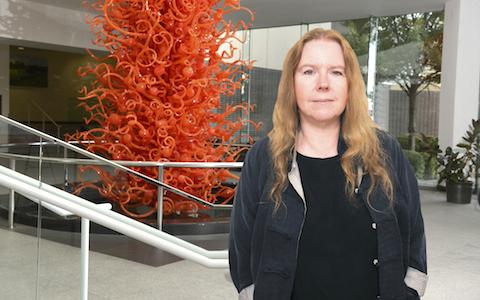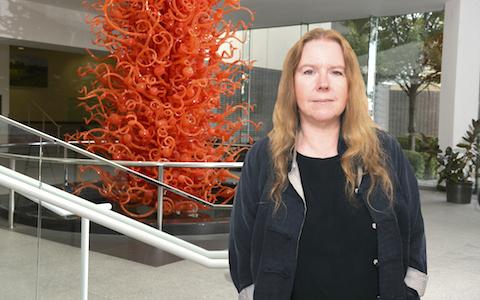
Credit: UT Southwestern
DALLAS, January 11, 2017 ? More than a decade after the HPV vaccine was deemed both safe and effective by the FDA for preventing several types of cancer, the vaccine is still underused by those who could benefit.
UT Southwestern's Harold C. Simmons Comprehensive Cancer Center is joining 68 other NCI-designated cancer centers around the U.S. to help raise awareness and boost vaccination rates, following a recently revised schedule by the Center for Disease Prevention (CDC).
"As an NCI-recognized comprehensive cancer center, we are known for our novel research and cutting edge treatments. Preventing cancer is equally important," said Dr. Melanie Cobb, Interim Director of the Simmons Cancer Center and Professor of Pharmacology. "Improving HPV vaccination is an example of a proven evidence-based prevention strategy that can save thousands of lives in the future." Dr. Cobb holds the Jane and Bill Browning Jr. Chair in Medical Science.
The new CDC guidelines recommend that children aged 11 to 12 should receive two doses of the HPV vaccine at least six months apart. Adolescents and young adults older than 15 should continue to complete the three-dose series.
"HPV vaccine delivery is challenging because of the dosing schedule and parental hesitation about vaccines," said Dr. Celette Sugg Skinner, Interim Chair of the Department of Clinical Sciences, Associate Director for Population Research at the Simmons Cancer Center, and holder of the Parkland Community Medicine Professorship at UT Southwestern. "In order to reach our goal, we must offer both education and vaccine opportunities at all pediatric health care visits."
According to the CDC, incidence rates of HPV-associated cancers have continued to rise, with approximately 39,000 new HPV-associated cancers now diagnosed each year in the United States. Although HPV vaccines can prevent the majority of cervical, anal, oropharyngeal (middle throat) and other genital cancers, vaccination rates remain low across the U.S., with just 41.9 percent of girls and 28.1 percent of boys completing the recommended vaccine series.
Research shows there are a number of barriers to overcome to improve vaccination rates, including a lack of strong recommendations from physicians, and parents not understanding that this vaccine protects against several types of cancer.
Facts about HPV
NCI-Cancer Centers endorse updated HPV vaccine recommendations (PDF)
What is HPV?
Dr. Jasmin Tiro, Associate Professor of Clinical Sciences at UT Southwestern, has led a team of researchers who have conducted extensive research on how these barriers can be addressed.
"To increase use of the vaccine, it is vital to clearly share information with parents so they can make informed choices for their children," said Dr. Tiro. "We have looked at how providers recommend the vaccine: the specific language they use, and whether they are clear in their communications."
###
Dr. Tiro's team is currently testing using tablets to communicate effectively with parents, including parents of adolescent girls and boys, Hispanics, and African-Americans. Their work is funded by the NCI.
NCI-designated cancer centers have organized a continuing series of national summits to share new research, discuss best practices, and identify collective action toward improving vaccination rates. The original joint statement, published in January 2016, was the major recommendation from a summit hosted at The University of Texas MD Anderson Cancer Center in November 2015, which brought together experts from the NCI, CDC, American Cancer Society and more than half of the NCI-designated cancer centers.
The Harold C. Simmons Comprehensive Cancer Center is the only NCI-designated Comprehensive Cancer Center in North Texas and one of just 47 NCI-designated Comprehensive Cancer Centers in the nation. Simmons Cancer Center includes 13 major cancer care programs. In addition, the Center's education and training programs support and develop the next generation of cancer researchers and clinicians. Simmons Cancer Center is among only 30 U.S. cancer research centers to be designated by the NCI as a National Clinical Trials Network Lead Academic Participating Site.
About UT Southwestern Medical Center
UT Southwestern, one of the premier academic medical centers in the nation, integrates pioneering biomedical research with exceptional clinical care and education. The institution's faculty includes many distinguished members, including six who have been awarded Nobel Prizes since 1985. The faculty of almost 2,800 is responsible for groundbreaking medical advances and is committed to translating science-driven research quickly to new clinical treatments. UT Southwestern physicians provide medical care in about 80 specialties to more than 100,000 hospitalized patients and oversee approximately 2.2 million outpatient visits a year.
###
This news release is available on our website at http://www.utsouthwestern.edu/news.
To automatically receive news releases from UT Southwestern via email, subscribe at http://www.utsouthwestern.edu/receivenews.
Media Contact
Lori Sundeen Soderbergh
[email protected]
214-648-3404
@UTSWNews
http://www.swmed.edu
############
Story Source: Materials provided by Scienmag





